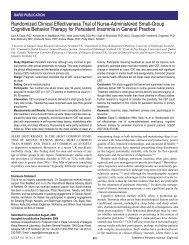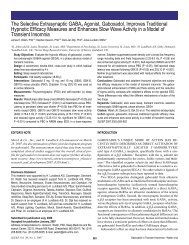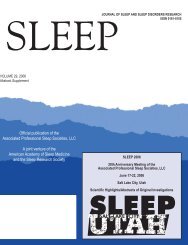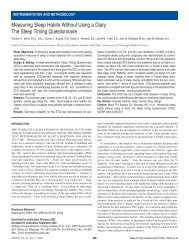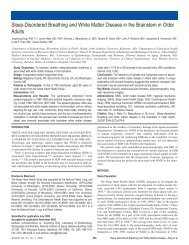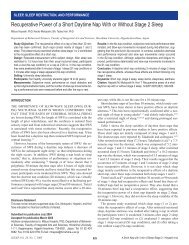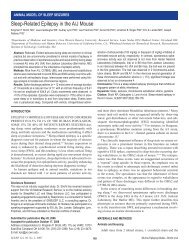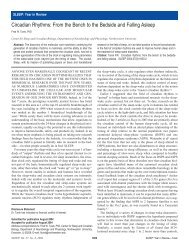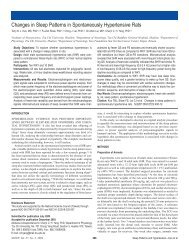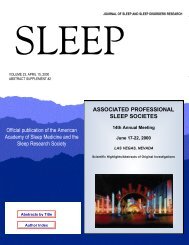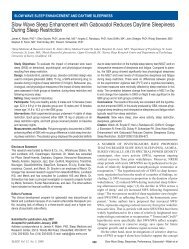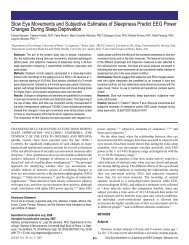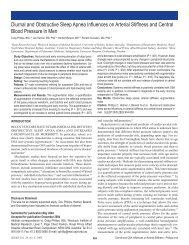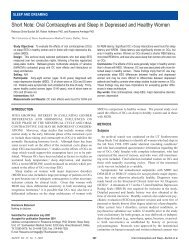SLEEP 2011 Abstract Supplement
SLEEP 2011 Abstract Supplement
SLEEP 2011 Abstract Supplement
You also want an ePaper? Increase the reach of your titles
YUMPU automatically turns print PDFs into web optimized ePapers that Google loves.
B. Clinical Sleep Science XI. Pediatrics<br />
Results: A total of 45 children among 49 affected with narcolepsy and<br />
4 with idiopathic hypersomnia received modafinil. Mean age at onset of<br />
treatment was 10.9±3.5 years (age range: 3-16 yo). The average daily<br />
dose of modafinil was 388±158 mg (200 to 800mg). Duration of treatment<br />
varied from 28 days to 10 years (mean 933±965 days). The mean<br />
estimated improvement was 5.8±1.8 (self rating scale 0-9). Modafinil<br />
was interrupted in 12 children because of lack of efficacy (9), excessive<br />
cost (1), mild adverse effects (2). It was combined with other stimulants<br />
in 8 children (stimulants 6 and sodium oxybate 2). There were no reported<br />
adverse effects in 30/45 (66%) children. There were minor and<br />
transient adverse effects in 12 (26%) children, including headache (3),<br />
loss of appetite (2), dry mouth (2), irritability (1), tremor (1), hot flushes<br />
(1), tongue protrusion (1), and increased cataplexy (1). Treatment was<br />
interrupted due to an adverse effect in 2 children only.<br />
Conclusion: Modafinil was first line treatment in 85% of narcoleptic<br />
children in our cohort, showing a positive benefit/risk ratio in 75% of<br />
the cases, with a mean duration of use of 3 years. No severe AE occurred<br />
and most of the reported side effects were transient and benign.<br />
In our pediatric cohort, Modafinil appeared to be safe, well tolerated and<br />
effective.<br />
Support (If Any): PHRC AOM07-138, French health Ministry; promotor:<br />
Assistance Publique - Hôpitaux de Paris<br />
0822<br />
<strong>SLEEP</strong> DISORDERS IN THE SEVERELY MENTALLY<br />
HANDICAPPED: A REPORT CONCERNING THE<br />
REPERCUSSIONS FOR FAMILIES AND THE EXPERIENCES<br />
OF HEALTH PROFESSIONALS<br />
Franco P 1 , Rouzade C 2 , Lacau J 3 , Higgins S 4 , Desportes V 2<br />
1<br />
Pediatric Sleep Unit, HFME & INSERM U628, Lyon, France,<br />
2<br />
Department of Neuropediatrics, HFME, Lyon, France, 3 Reseau<br />
Lucioles, Lyon, France, 4 Reseau Hypnor, Lyon, France<br />
Introduction: The incidence of severe mental handicap in France is estimated<br />
at 3-4/1000 live births. Sleep disorders are frequent and often<br />
severe in this population of children. The aim of our study was to report<br />
on the current situation of families with severely mentally handicapped<br />
children and also medical staff who treat these children in France.<br />
Methods: With the help of the Reseau Lucioles, we addressed an adapted<br />
version of the Children’s Sleep Disturbance Scale (SDSC) questionnaire<br />
to the families of severely mentally handicapped children in<br />
France. We also distributed a questionnaire to paediatricians working<br />
with the Centre d’Action Médico Sociale Précoce , which is a centre for<br />
the prevention detection and treatment of mental handicap and also to<br />
paediatric neurologists present at the French Society of Neuropediatricians<br />
( SFNP) in 2010.<br />
Results: We received replies from 292 families. The population was<br />
made up of 75.9% children: 26.4% Angelman syndrome, 14.7% Rett<br />
syndrome ,12% autistic disorders and 46.8% of other pathologies.<br />
93.8% of the population who responded to the questionnaire stated that<br />
their child suffered from sleep disturbances. 43.8% classified the trouble<br />
as severe or very severe. We found a reported incidence of 70% concerning<br />
sleep onset insomnia , 51% reporting short sleep duration , 60%<br />
reporting night awakenings or sleep maintenance disorder, 12% with<br />
sleep respiratory disturbance, and 35% with excessive daytime sleepiness.<br />
Only 23% of people replying had found solutions to reported sleep<br />
disorders. 94.3% of parents and 41.1% of siblings estimated that they<br />
were “quite” or “very “ bothered by sleep problems presented by the<br />
mentally handicapped member. We analysed 154 questionnaire replies<br />
from medical doctors, who estimated that less than 50% of their patients<br />
suffered from sleep disorders . They also expressed their difficulty in<br />
diagnosing and treating such pathologies.<br />
Conclusion: Our study highlights the need for progress in the management<br />
of sleep disorders in the severely mentally handicapped children.<br />
0823<br />
<strong>SLEEP</strong> HYGIENE AND ACTIGRAPHICALLY EVALUATED<br />
<strong>SLEEP</strong> CHARACTERISTICS IN CHILDREN WITH IN<br />
CHILDREN WITH BENIGN CHILDHOOD EPILEPSY WITH<br />
CENTROTEMPORAL SPIKES<br />
Giannotti F, Cortesi F, Panunzi S, Cupellaro S, Ubertini C<br />
Pediatrics & Develop Neuropsychiatry, Center of Pediatric Sleep<br />
Disorders University of Rome La Sapienza, Rome, Italy<br />
Introduction: Sleep problems are frequent in epileptic children. Although<br />
several studies described the relationship between epilepsy and<br />
sleep, no studies investigated sleep hygiene (SH) in these children. Aim<br />
of this study is to investigate SH and sleep in children with Benign childhood<br />
epilepsy with centrotemporal spikes (BCECTS) where it is generally<br />
presumed that quality of life is not significantly affected.<br />
Methods: A sample of 85 epileptic (mean age 7.6 years)and 182 typically<br />
developing children (TD) (mean age 7.8 years) were investigated.<br />
None of epileptics had frequent seizures and were drug-free. Parents<br />
completed Children’s Sleep Hygiene Scale (CSHS, Harsh, 2001) and<br />
Children’s Sleep Habits Questionnaire (CSHQ, Owens 2000). Sleep was<br />
actigraphically evaluated for 7 consecutive nights.<br />
Results: ANOVA results showed that epileptic children scored significantly<br />
higher on CSHQ (Total 57 vs 43, Bedtime Resistance 10 vs<br />
8, Night-Wakings 6 vs 3, Sleep Anxiety 8 vs 5, Parasomnias 12 vs 8,<br />
Sleep Duration 5 vs 4,p



